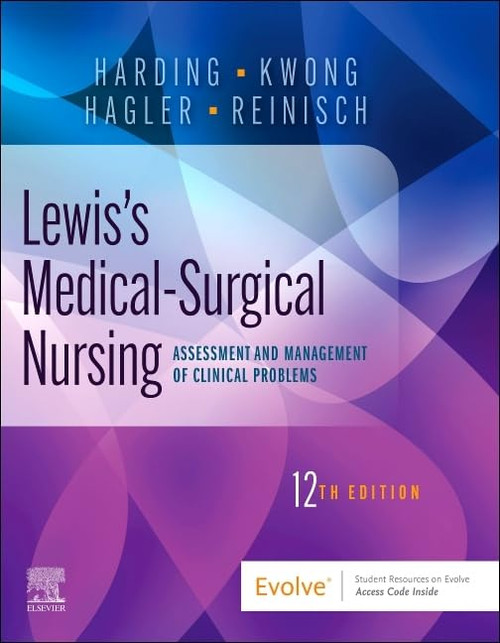This book contains solid, research-based content presented in a concise, readable, and consistent format. Special features highlight the content that is most relevant and challenging for today's nursing students, including patient teaching, community and home care, gerontology, cultural and ethnic considerations, collaborative care, nutrition, and critical thinking. Nursing management content is discussed in a unique levels-of-care approach, with separate headings for Health Promotion, Acute Intervention, and Ambulatory and Home Care. More than just a textbook, it is a comprehensive resource with the essential information that students need to prepare for lectures, classroom activities, examinations, clinical assignments, and comprehensive care of patients.
- All content is written and reviewed by leading experts in the field to ensure that information is comprehensive, current, and clinically accurate.
- Extensive gerontologic content identifies age-related changes for each body system and alerts the nurse to differences often encountered in older patients.
- Attractive four-color design and over 1,300 full-color illustrations enhance learning by presenting disease processes and related anatomy and physiology more clearly.
- More than 70 comprehensive nursing care plans are thoroughly updated to incorporate current NANDA diagnoses, defining characteristics, expected outcomes, specific nursing interventions with rationales, evaluation criteria, and collaborative problems.
- Ethical Dilemmas boxes promote critical thinking for timely and sensitive issues that nursing students will face in practicetopics such as informed consent, patient adherence, guardianship, confidentiality, and sterilization.
- More than 70 Patient and Family Teaching Guides provide students with critical information to include in teaching patients about care of conditions and stress points for educating family members when they will be helping to care for the patient.
- Critical Thinking Exercises at the end of each nursing management chapter include Case Studies with Critical Thinking Questions to help students apply information presented and promote critical thinking. Also included are Nursing Research Issues questions to highlight current topics for research and encourage further study.
- Collaborative Management headings and Collaborative Care tables emphasize the importance of total patient care in today's health care settings and provide a clear understanding of each provider's role in managing disorders.
- Multiple-choice Review Questions at the end of each chapter test students' mastery of the content and correspond with learning objectives in the chapter openers.
- Nutritional Therapy tables summarize nutritional interventions and promote healthy lifestyles in patients with various conditions.
- Gerontologic Differences in Assessment and Effects of Aging tables present information about older adults' special needs for nursing care.
- Nursing Research boxes apply research to clinical practice and cover such timely topics such as pain medication adherence, ethnic influences on cancer screening, family-centered focus in lung transplant care, health promotion for women with multiple sclerosis, and caring for battered women in the emergency department.
- Emergency Management tables outline the treatment of health problems most likely to create medical emergencies.
- Common Assessment Abnormalities tables alert the nurse to typically encountered abnormalities.
- Nursing Assessment tables summarize the subjective and objective data for which the nursing student assesses.
- Health History tables present key assessment questions to summarize important assessment parameters.
- Diagnostic Studies tables highlight important information relevant to diagnostic studies.
- Drug Therapy tables pull out medication information in a format that provides easy student reference
- Learning Objectives at the beginning of each chapter help students identify key content
- New chapter on Culturally Competent Care discusses cultural variations affecting health care and key nursing implications to help prepare nurses to interact with the increasingly diverse patient populations entrusted to nursing care.
- New chapter on End-of-Life Care discusses the physical and psychosocial manifestations at the end of life, related legal and ethical issues, palliative care, and the special needs of caregivers.
- New chapter on Nursing Management: Alzheimer's Disease and Dementia covers Alzheimer's disease and other causes of dementia.
- Evidence-Based Practice boxes discuss non-nursing or interdisciplinary research topics.
- Genetics in Clinical Practice boxes cover timely topics such as genetic testing, Alzheimer's disease, sickle cell anemia, and genetics-related ethics issues.
- Complementary and Alternative Therapies boxes summarize what nurses need to know about topics such as various herbal remedies, acupuncture, and biofeedback.
- The accompanying CD-ROM has been expanded and includes: case studies, disorder overviews, interactive learning activities, NCLEX-style review questions, and a comprehensive glossary.
- Selected nursing care plans incorporating NIC (Nursing Interventions Classification) and NOC (Nursing Outcomes Classification) show how NIC and NOC are used in clinical practice.
- Included on the Evolve website are the concept map creator program and sample concept maps to familiarize students these clinical tools which are used by increasing numbers of nursing instructors.
- Chapter 9: Pain has been completely updated and rewritten.
- New chapter on Nursing Management: Musculoskeletal Trauma and Orthopedic Surgery covers sprains, strains, fractures, joint surgery, and other related conditions.
- The Genetics and Altered Immune Responses chapter includes expanded content on genetics and immunosuppressant therapy for transplant patients.
- Key Terms are listed in chapter openers (with page numbers) and bolded where defined in the text narrative.
- The Addictive Behaviors chapter features a more holistic approach and contains expanded content on tobacco abuse and smoking cessation.
- New color photos throughout feature ethnic and cultural diversity.










